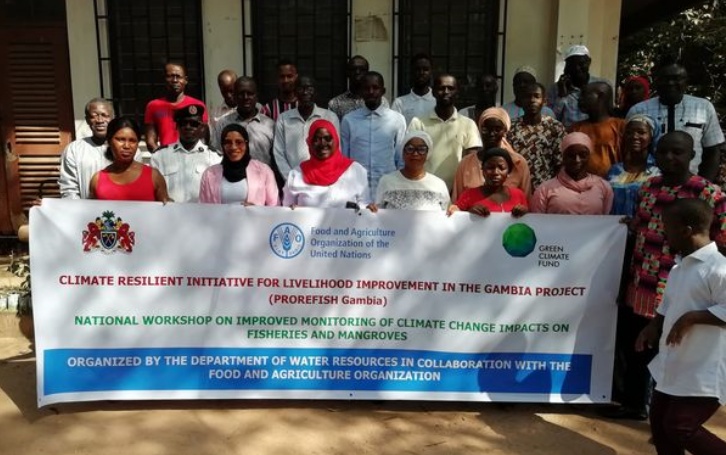Gambiaj.com – (Brikama, The Gambia) – Climate change, a global phenomenon with far-reaching consequences, is impacting ecosystems in The Gambia, including mangroves and fisheries that are vital to the environment and livelihoods. To address these challenges, the Department of Water Resources and the Food and Agriculture Organization (FAO), under the framework of a Letter of Agreement, convened a three-day training workshop in Brikama.
The initiative aims to equip stakeholders and experts with tools to monitor the impacts of climate change on these fragile ecosystems.
The training is part of the Climate Resilient Fishery Initiative for Livelihood Improvement Project (PROREFISH), supported by Green Climate and the FAO.
Speaking at the opening, Deputy Director at the Department of Water Resources, Foday Conteh, emphasized the importance of preserving mangroves and fisheries.
“Mangroves are not merely subjects of scientific inquiry; they are essential components of the global ecosystem,” Conteh said. He explained that mangroves provide critical habitats for countless species, support coastal communities, and act as natural barriers against storm surges and coastal erosion.
However, he warned that mangroves are under unprecedented threats due to climate change. Highlighting the importance of the workshop, Conteh urged participants to commit to sustainable environmental practices.
“Let us remember that our actions today will shape the world tomorrow. Together, we have the power to preserve and protect our natural heritage for generations to come,” he said.
Participants in the workshop will explore strategies to address climate change impacts on fisheries and mangroves, focusing on sustainable solutions to mitigate these challenges.
The workshop was officially opened by Musa Baldeh, a representative of the Governor of the West Coast Region. His remarks underscored the urgency of collective action to safeguard The Gambia’s natural resources in the face of a changing climate.
The three-day training is expected to produce actionable outcomes to strengthen the resilience of these ecosystems and the livelihoods they support.










